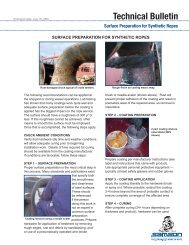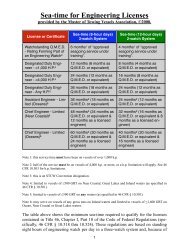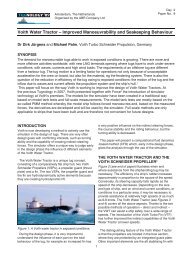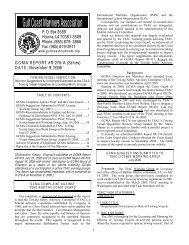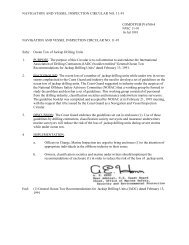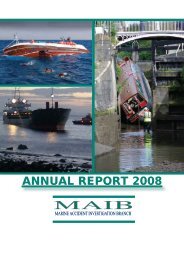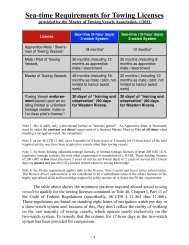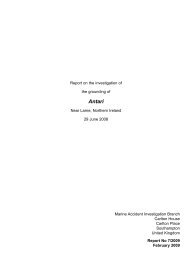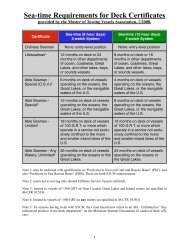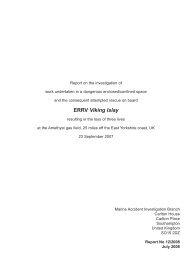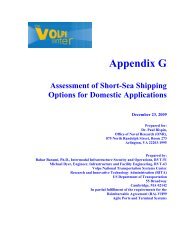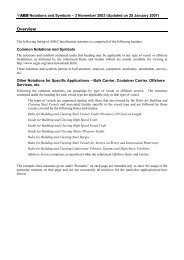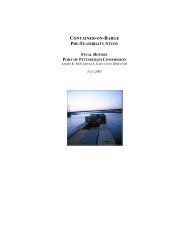R-429-G, Rev. 2 - Towmasters: the Master of Towing Vessels Assoc ...
R-429-G, Rev. 2 - Towmasters: the Master of Towing Vessels Assoc ...
R-429-G, Rev. 2 - Towmasters: the Master of Towing Vessels Assoc ...
You also want an ePaper? Increase the reach of your titles
YUMPU automatically turns print PDFs into web optimized ePapers that Google loves.
our logbook initiative in particular. The NationalTransportation Safety Board is an independent Federalagency and not part <strong>of</strong> <strong>the</strong> U.S. Department <strong>of</strong>Transportation. NTSB furnished a copy <strong>of</strong> a Coast Guardletter dated October 8, 1999 in reference to NTSB fatiguerecommendations. In <strong>the</strong> final paragraph <strong>of</strong> that letter, ViceAdmiral T.W. Josiah, Coast Guard Chief <strong>of</strong> Staff, states that<strong>the</strong> "...complexities <strong>of</strong> <strong>the</strong> marine transportation systempreclude <strong>the</strong> Coast Guard from establishing scientificallybased hours <strong>of</strong> service at this time."Since <strong>the</strong> Coast Guard resisted taking a meaningful firststep to require lower-level mariner's to record <strong>the</strong>ir actualhours <strong>of</strong> service aboard commercial vessels, <strong>the</strong>y fell evenfar<strong>the</strong>r behind o<strong>the</strong>r modal administrations in implementing<strong>the</strong> NTSB's hours-<strong>of</strong>-service safety recommendations,specifically:(NTSB M-99-1). "Establish within 2 years scientificallybased hours-<strong>of</strong>-service regulations that set limits on hours <strong>of</strong>service, provide predictable work and rest schedules, andconsider circadian rhythms and human sleep and restrequirements."The Coast Guard is almost 40 years behind <strong>the</strong> truckingindustry in requiring its lower-level mariners to log <strong>the</strong>irhours <strong>of</strong> service. GCMA believes NTSB RecommendationM-99-1 has merit and must no longer be ignored. We alsobelieve that requiring overtime pay beyond 40 hours perweek in <strong>the</strong> maritime industry would encourage accuraterecordkeeping and lessen <strong>the</strong> abuse <strong>of</strong> existing work-hourregulations documented by our <strong>Assoc</strong>iation. (1) Fur<strong>the</strong>rmore,<strong>the</strong> use <strong>of</strong> time clocks to record hours <strong>of</strong> work on largercommercial vessels and required logbook entries made inink deserve careful consideration. (2) [ (1) The matter <strong>of</strong>overtime pay extends beyond <strong>the</strong> scope <strong>of</strong> this report. (2) TheNational Highway Traffic Safety Administration isevaluating sophisticated time and data recorders forinstallation in long-haul trucks while <strong>the</strong> Coast Guardhasn’t even considered time clocks!]AMERICAN WATERWAYS OPERATORS’STANDARD LOGBOOK ENTRIESThe American Waterways Operators (AWO)Responsible Carrier Program (RCP) under its "SamplePolicies and Procedures" listed a number <strong>of</strong> acceptablelogbook recommendations that we list below.GCMA notes that <strong>the</strong> Coast Guard actively promotes <strong>the</strong>Responsible Carrier Program (RCP) and even signed asafety partnership agreement with this trade association toencourage safety in <strong>the</strong> towing industry. The towingindustry has a poor safety record that it needs to improveupon. (1) [ (1) Refer to GCMA Report # R-351. <strong>Rev</strong>.1. Oct. 24,2006. How Safe Is The <strong>Towing</strong> Industry?]We commend and support <strong>the</strong>se specific logbookrecommendations to <strong>the</strong> Coast Guard and to Congress as webelieve <strong>the</strong>y would:— improve <strong>the</strong> investigation <strong>of</strong> accidents by Coast GuardInvestigating Officers,— improve enforcement <strong>of</strong> work-hour statutes andregulations,— provide a record <strong>of</strong> <strong>the</strong> persons standing watch and <strong>the</strong>times at which <strong>the</strong> watch was relieved, and— serve as a repository <strong>of</strong> information required to be loggedby existing and proposed regulations.GCMA urges that logbook requirements should beextended to all commercial vessels under 1,600 grossregister tons and to any larger vessels in domestic servicethat are not required to fill out an <strong>of</strong>ficial logbook.[American Waterways Operators]A.1/A.2 VESSEL OPERATING PROCEDURESh. Vessel Log/Required Logbook EntriesA. GENERAL GUIDANCE/OVERVIEW· This procedure establishes guidelines for <strong>the</strong>maintenance <strong>of</strong> vessel logs on board Responsible <strong>Towing</strong>Company vessels.· It is extremely important that entries regarding accidentsbe completed, regardless <strong>of</strong> how trivial an incident mayseem at <strong>the</strong> time. The log must contain a true and accuraterecord <strong>of</strong> <strong>the</strong> event, and any questions concerning<strong>the</strong> information to be included in <strong>the</strong> log should bereferred to <strong>the</strong> Operations Manager.B. PROCEDURES1. Each Responsible <strong>Towing</strong> Company vessel mustmaintain an <strong>of</strong>ficial log. The following guidelines formaintaining <strong>the</strong> log must be adhered to:a) The log must kept daily, accurately, and legibly;b) The log must be retained aboard <strong>the</strong> vessel for a period<strong>of</strong> one year;c) Log entries, properly dated, must be made as soon aspossible after <strong>the</strong> occurrence for which <strong>the</strong> entry is made;d) No errors or erasures should be made in <strong>the</strong> log. Anyincorrect statements must be corrected by drawing asingle line through <strong>the</strong> entry and initialing it; and,e) The log must be returned to <strong>the</strong> Responsible <strong>Towing</strong>Company main <strong>of</strong>fice by January 15th <strong>of</strong> <strong>the</strong> followingyear.2. The following information is required to be entered in<strong>the</strong> Responsible <strong>Towing</strong> Company logbook:a) Details <strong>of</strong> all required monthly fire, boat, manoverboard, abandon ship, damage control and vesselresponse plan drills;b) Details <strong>of</strong> steering gear, navigation equipment, andcommunications gear tests conducted prior to departurefrom port;c) Results <strong>of</strong> weekly and monthly testing <strong>of</strong> emergencylighting and power systems;d) Fuel and lube oil data, including <strong>the</strong> amount <strong>of</strong> fuel orlube oil transferred to or from <strong>the</strong> o<strong>the</strong>r vessel;e) Offenses by and/or disciplinary actions against crewmembers,including a statement concerning <strong>the</strong>notification <strong>of</strong> such an entry to <strong>the</strong> crewmember. Anyreply by <strong>the</strong> crewmember must be recorded in <strong>the</strong> logand a copy <strong>of</strong> <strong>the</strong> entries must be furnished to <strong>the</strong>crewmember, duly executed by <strong>the</strong> master and ano<strong>the</strong>rmember <strong>of</strong> <strong>the</strong> crew;f) The nature <strong>of</strong> any illness suffered by a crew-member,including medical treatment administered and <strong>the</strong> name<strong>of</strong> <strong>the</strong> individual who administered it;3 February 2007



